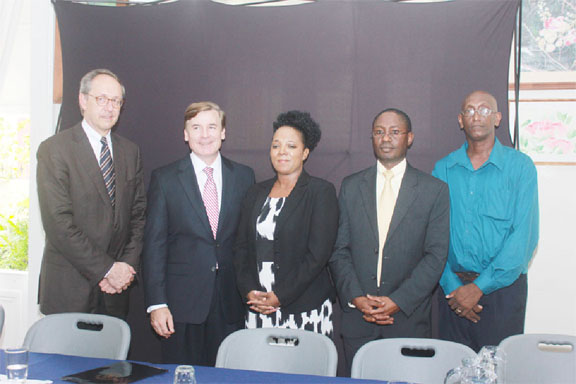Local journalists are expected to benefit from a four-day workshop that is being hosted by the University of Guyana Centre for Communication Studies (UGCCS), the Institute for International Journalism of Ohio Univer-sity’s Scripps College of Communication, and the United States Embassy in Georgetown.
The workshop, being held under the theme “Democracy, Reporting and Responsibility: Fundamentals for an Informed Society,” will be catering to entry level and mid-career journalists as well as those who may need refresher training.
A special session for editors and media managers on media management will also be held.
The workshop will also cover topics such as advocacy journalism and social responsibility, political communication and democratisation, including professionalising television news in emerging democracies and investigative reporting.

Participants will be tutored by former Washington Bureau Chief of the Washington Post Andrew Alexander and Dr Yusuf Kalyango, Director of the Institute for International Journalism and Professor at Ohio University.
An opening ceremony was held yesterday at Moray House, which is the official venue, and the first session of the workshop will begin today.
Speaking at the ceremony, US Ambassador to Guyana Brent Hardt noted that the initiative is not the first partnership between the two universities. “Our embassy welcomes and encourages collaboration and alliances between the US and Guyanese institutions because these relationships enhance mutual understanding between our two countries and build even closer people-to-people ties,” he said.
These closer ties, Hardt said, allows us to work closely in addressing common challenges, including citizen security, economic opportunity, social inclusion and environmental sustainability.
Of the workshop, Hardt added that “professionalisation contributes to building a more effective and independent media while improving standards in collecting, reporting, editing and disseminating objective and balanced information.”
He further said, “Such professional training encourages reporting that encompasses the many different facets of issues and improves standards for reporters and editors to make the information they present more objective and balanced.”
Deputy Vice-Chancellor of UG Phillip Da Silva told those in attendance at the opening that the workshop will enhance the knowledge and sharpen the skills of journalists here. He also said that a free press is at the core of equitable development, while adding that too often the public’s interest is ignored in favour of personal bias and when this happens the role of the journalist in a democratic society is challenged.
Meanwhile, Dr Kalyango noted that Ohio University has been sending a number of students on internships around the world and they will now consider Guyana as a central point to send students to interact.
“We hope, starting from next year, we bring study abroad programmes where we bring on average 12 to 14 students. A few weeks ago, Ohio University signed an Activity Agreement in addition to the Memorandum of Understanding we signed last year to actually start this process of bringing students here as a group to interact with UG students…,” he explained.
Dr Kalyango also said that in the future, he will be working to introduce American editors to Guyana so that they can come and see what we have here and Guyana can be on their screen as they decide which stories to run from around the world.
The final speaker at the opening ceremony was Alexander, who observed that while the journalistic profession in Washington is more developed than it is here, in a way it is also the same because we all start at the same place.
Alexander, who said the greatest value of such workshops is what the facilitators get from the particip
ants, described journalism as an enormously satisfying profession. “Those of us who are to spend our lives in journalism didn’t get in it to make a lot of money. We get in it either because we like the thrill of journalism, we wanted to see the world or we wanted to right wrongs…” he noted.





